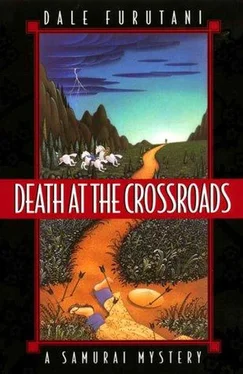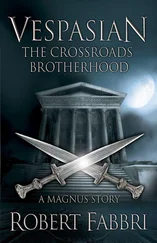Dale Furutani - Death at the Crossroads
Здесь есть возможность читать онлайн «Dale Furutani - Death at the Crossroads» весь текст электронной книги совершенно бесплатно (целиком полную версию без сокращений). В некоторых случаях можно слушать аудио, скачать через торрент в формате fb2 и присутствует краткое содержание. Год выпуска: 2011, ISBN: 2011, Жанр: Исторический детектив, на английском языке. Описание произведения, (предисловие) а так же отзывы посетителей доступны на портале библиотеки ЛибКат.
- Название:Death at the Crossroads
- Автор:
- Жанр:
- Год:2011
- ISBN:068815817X
- Рейтинг книги:3 / 5. Голосов: 1
-
Избранное:Добавить в избранное
- Отзывы:
-
Ваша оценка:
- 60
- 1
- 2
- 3
- 4
- 5
Death at the Crossroads: краткое содержание, описание и аннотация
Предлагаем к чтению аннотацию, описание, краткое содержание или предисловие (зависит от того, что написал сам автор книги «Death at the Crossroads»). Если вы не нашли необходимую информацию о книге — напишите в комментариях, мы постараемся отыскать её.
Death at the Crossroads — читать онлайн бесплатно полную книгу (весь текст) целиком
Ниже представлен текст книги, разбитый по страницам. Система сохранения места последней прочитанной страницы, позволяет с удобством читать онлайн бесплатно книгу «Death at the Crossroads», без необходимости каждый раз заново искать на чём Вы остановились. Поставьте закладку, и сможете в любой момент перейти на страницу, на которой закончили чтение.
Интервал:
Закладка:
Jiro stared at this unusual man, not sure what to make of him. When they returned to the village of Suzaka, the Magistrate went off to report to the District Lord. Jiro had offered Kaze breakfast, but Kaze refused, saying he had eaten some toasted rice balls when he started on the road that morning.
Jiro spent the morning delivering charcoal to his regular customers. Kaze also roamed the village, looking as if he were searching for something. His presence made the villagers nervous, and in a way this was good for Jiro because it took attention away from his news about the increase in charcoal prices.
As Kaze looked around, he realized that Suzaka was more like a buraku , a hamlet, than a mura , a real village. The buraku was a relatively small grouping of farmhouses, and groups of buraku would form a mura. Here in the mountains, the land could not sustain a large number of buraku.
Now, with the sun down and the evening meal cooked, Jiro didn’t know what to expect from this samurai. He worried about what might happen, because he had never had a samurai stay in his farmhouse before. In fact, since his wife died, he rarely had people in his house at all. He fretted over possible scenarios in which the samurai would be demanding or threatening. He even thought the samurai might beat him because the fare he was offering was so meager. He would never have predicted that the samurai would actually thank him.
“ Chotto matte, kudasai . Wait a minute, please,” Jiro said. He hesitated a moment, then moved over to a corner of the platform. He lifted up one of the floorboards. The use of a metal nail or wooden pegs to hold them down would have been an unthinkable luxury. The floorboards were simply laid on the floor joist.
Jiro reached under the board and lifted out a pottery jar with a piece of coarse cloth covering the mouth. Jiro removed the cloth and offered the jar to the samurai. “ Tsukemono? Pickles?”
The samurai peered into the jar and quickly jerked his head back as the pungent odor assaulted his nostrils, overpowering even the smell of smoke and the loamy smell of earth. Inside the jar were small eggplants and cabbage leaves fermented in bran and salt. He gingerly picked some of the pickles out of the jar with his hashi and nibbled at one.
“Good, but powerful enough to kill flies.”
Jiro laughed. “It’s my own recipe. It’s my secret to long life.”
“How old are you?”
“Fifty years.”
Fifty years was positively ancient. Boys could see their first battle at twelve, people were often married at fourteen, and a woman past thirty-five could expect to be addressed as obaasan: grandmother. A peasant living through his forties was unusual. Kaze was thirty-one. He had lived through the dangerous year of twenty-nine, but that year had indeed been a fateful one, just as the folk belief said it would be. So much of his life had been lost or changed since then; he had no wish to catalog the changes. He dipped his hashi back into the pungent jar and fished out some more pickles.
“The village looks run down,” Kaze said as he continued to eat small bites of pickle with his porridge.
“It might as well be taken by devils,” Jiro answered.
“Why?”
Jiro’s wariness, temporarily dispelled by the samurai’s politeness, quickly returned.
“Problems,” he said vaguely.
“What kind of problems?”
“Our District Lord is a little … strange.”
“In what way?”
“I’m sorry. I’m very ignorant. I shouldn’t talk of my betters.”
“Why are you suddenly acting stupid when I can tell you’re an intelligent man?”
Jiro bowed. “Please forgive me, but …” He let the sentence trail off. A clear sign he didn’t want to continue. Kaze turned his attention back to his porridge and didn’t press the charcoal seller.
Jiro surreptitiously examined the man eating his food. Kaze was of normal height for a man of his time, which would make him five foot one or five foot two. From the swell of his forearms and the bulge of his shoulders under his kimono, Jiro could see that Kaze was very muscular, but he was also exceptionally agile, as Jiro had witnessed when Kaze came down the mountain to the crossroads. The samurai’s face was square-cut and had high cheekbones, with dark brows that almost met above the bridge of his nose. His face was burnt brown from the sun, the result of a long time on the road. Kaze didn’t shave the front part of his head as other samurai did. Instead he drew his glossy black hair back into a ponytail. Jiro decided this strange samurai was handsome.
Despite an outwardly casual manner, one aspect of the samurai did bother Jiro. Kaze seemed to keep his sword close at hand at all times, as if he expected an attack at any moment. Jiro knew that samurai considered their swords to be extensions of their souls, but he found it strange that Kaze never had his sword farther away than a short stretch of his arm. He also found it strange that Kaze only carried one sword, the long katana. Samurai usually carried two swords, the long katana and the shorter wakizashi . The short wakizashi was used as an auxiliary weapon and for other tasks, such as ritual suicide. Samurai called the wakizashi the “guardian of honor.” Jiro wondered why Kaze didn’t carry one.
After closing off any conversation about the Lord, Jiro tried to make amends through small talk. It was an effort for him, but he decided civility was the right tack to take with this particular samurai.
“Have you been on the road long?”
“Too long.”
“Where is your home?”
“I no longer have a home. I’m a ronin, a ‘wave man.’ Like the waves of the ocean, I call no land home. Like water on rocks, I can’t mix in and settle. I am always pulled back to flow to the next shore.”
Jiro, who was not an articulate man, found this rush of words both peculiar and pleasing. The play off the meaning of “ronin” was something he could easily understand but which would have been beyond his power to invent. It gave him a feeling of both awe and sadness.
“That’s good. I wish I could think like that.”
“It’s true. I wish I had no reason to think like that.”
Jiro had no response. He sucked air through his teeth, cocked his head to one side, and smiled. The samurai smiled back.
“Tell me something,” Kaze said.
“What?”
“Are there many farmhouses outside the village?”
“A few. No one lives in most of them. Too many bandits.”
“Do you know the families that do live there?’
“Yes.”
“Have any bought a girl recently? She’d be around nine years old now. She would probably be sold as a servant. She might have a kimono with a mon , a family crest, of three plum blossoms.”
“No one has money here but the bandits. They take what they want, not buy. No one here has servants, except the Magistrate and the Lord.”
“How long has the bandit problem been so severe here?”
“There’ve always been a few, but the last two years have been terrible.”
“Why has it gotten so terrible in the last two years?”
“No reason,” Jiro said warily.
“No reason at all?”
“No. It’s just gotten bad in two years.”
“Several bands of bandits, or just one?”
“One. They killed off the others, or made them join. Boss Kuemon is in charge.”
Kaze put down his empty bowl of gruel. Jiro pointed toward the pot with his chin, to see if Kaze wanted more. The samurai shook his head no. He found a clear spot and seemed to be settling down for the night, sleeping, Jiro noted, with his sword tucked in his arms. Jiro banked the fire and settled down himself.
“Want a futon ?” Jiro asked, digging out one of the sleeping mats for himself.
Читать дальшеИнтервал:
Закладка:
Похожие книги на «Death at the Crossroads»
Представляем Вашему вниманию похожие книги на «Death at the Crossroads» списком для выбора. Мы отобрали схожую по названию и смыслу литературу в надежде предоставить читателям больше вариантов отыскать новые, интересные, ещё непрочитанные произведения.
Обсуждение, отзывы о книге «Death at the Crossroads» и просто собственные мнения читателей. Оставьте ваши комментарии, напишите, что Вы думаете о произведении, его смысле или главных героях. Укажите что конкретно понравилось, а что нет, и почему Вы так считаете.












